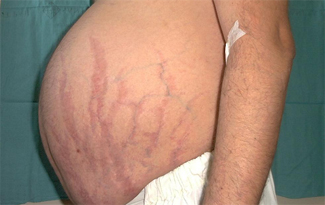Quality of life in Cushing's syndrome

Excessive production of cortisol in Cushing's syndrome leads to physical and psychological health consequences (obesity, muscle weakness, bruising, lack of libido, depression...). After successful medical treatment cortisol levels are normalized, but patients don't recover a good quality of life. Up to now quality of life had been evaluated with generic questionnaires that did not contemplate all the problems of these patients. This led to the need to create a new questionnare, CushingQoL, which is specific for Cushing's syndrome and has demonstrated to be valid and reliable. Results in different European countries have been obtained with positive results.
Patients with Cushing's syndrome produce too much cortisol, a hormone secreted by the adrenal glands. Chronic exposure to increased levels of cortisol (hypercortisolism) produces: obesity (mainly in the trunk), muscle weakness (mainly in the pelvic zone), body hair excess, moon face (round and red), delayed wound healing and easy bruising, skin erosions with minimal trauma, hypertension, hyperglycaemia, osteoporosis, menstrual irregularities, lack of libido and depression. All these symptoms have a great impact on health related quality of life (HRQL), physically, mentally and emotionally.
Despite what might be expected, it has been observed that once cortisol has normalised, after treatment, these patients do not recover their HRQL. Therefore, it is important to take into account the patients' point of view on how the disease ahs impacted on the patient, subjectively, and not only the hormonal levels.
Up to now quality of life in these patients had been measured with generic questionnaires that did not include specific problems of Cushing's syndrome. The aim of this study was to develop an easy and specific questionnaire that reflected problems experienced by these patients and which has been called CushingQoL. It was developed originally in Spanish and has been translated to 16 languages; it has demonstrated good psychometric properties, as reliability and validity.
In this transversal, international and multicentric study validity of the questionnaire in clinical practice is confirmed. One hundred and twenty five patients of 5 different countries completed the questionnaire, together with another generic quality of life questionnaire (SF-36) and a question on global health perception (between very bad and very good, with 7 possible answers). Furthermore, clinical and sociodemografic data were collected. The CushingQoL score diminished as the health perception worsened. In addition, worse CushingQoL scores were found in patients diagnosed over the prior two years (when they had been diagnosed and treated initially), in patients with current hypercortisolism and in patients with hospitalisations during the last year, with respect to the patients who did not present these conditions. There was no correlation between CushingQoL socres and time since surgery or presence or not of adrenal insufficiency after surgery, but there was a positive correlation between time since diagnosis of adrenal insufficiency and CushingQoL score.
The results show that the CushingQoL questionnaire is a valid and reliable instrument. Future studies should confirm other psychometric parameters, as sensitivity to change (the score changes when clinical changes occur) and reliability test-retest (i.e., scores do not change on retesting patients who are clinically stable).
For more information on Cushing’s syndrome: www.ercusyn.eu
References
"Evaluation of health-related quality of life in patients with Cushing's syndrome with a new questionnaire". Webb, SM; Badia, X; Barahona, MJ; Colao, A; Strasburge, CJ; Tabarin, A; van Aken, MO; Pivonello, R; Stalla, G; Lamberts, SWJ; Glusman, JE. EUROPEAN JOURNAL OF ENDOCRINOLOGY, 158 (5): 623-630 MAY 2008.


